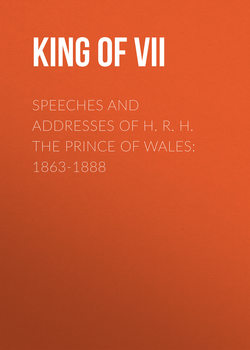Читать книгу Speeches and Addresses of H. R. H. the Prince of Wales: 1863-1888 - King of Great Britain Edward VII - Страница 13
SPEECH DAY AT WELLINGTON COLLEGE
ОглавлениеJuly 3rd, 1865
On the 3rd of July 1865, the ceremony of distributing prizes at Wellington College was performed by the Prince of Wales, in presence of a distinguished company. The Governors of the College were in attendance, the Bishop of Oxford, the Earl of Derby, Earl Stanhope, Lord Eversley, Lord Chelmsford, Mr. Walter, M.P., and Mr. Cox. At the luncheon, which followed the proceedings in the large hall of the College, the head master, Mr. Benson (now Archbishop of Canterbury), having proposed the toast of the Prince of Wales, thanking him for his presence that day, and for the kind favour and interest with which he had uniformly regarded the institution, the Prince replied: —
"My Lords and Gentlemen, – I am deeply sensible of the manner in which Mr. Benson has proposed my health, and in which it has been received by the company assembled here to-day. I need hardly assure you that it is a source of sincere gratification to me to find myself once more within the walls of Wellington College, taking part in the proceedings of 'Speech Day,' and distributing prizes to the successful competitors. Allow me, Mr. Benson, to congratulate you, and through you the whole college, on the highly efficient state in which I find it. I feel convinced that my young friends have not forgotten that it bears the name of one of the greatest soldiers England ever knew. In the success of this institution Mr. Benson has already mentioned, and I need hardly remind you, that the Queen takes a strong interest; a still greater interest was taken by my father, to whose exertions the college really owes its origin. I have now, my lords and gentlemen, a very pleasing task to perform, and that is to make an announcement which I hope will not be considered indiscreet on my part. At the last meeting of the Governors of Wellington College, Lord Derby intimated that it was his intention to devote the profits of his justly celebrated translation of 'Homer' to the production of a prize to be given annually as a reward to the foundationer who within the year of his leaving the college should conduct himself to the entire approbation of the Head Master – be considered, in fact, the most industrious and well-conducted boy or young man in the school. I feel certain that this announcement will be received with great pleasure. It will show you the interest which the noble lord takes in this institution, and will be a stimulus to increased exertion on the part of those within its walls. I thank you, Mr. Benson, for proposing, and you, my lords and gentlemen, for drinking, my health so cordially; and I assure you it affords me great gratification whenever I can do anything to promote the welfare of Wellington College."
The report of the proceedings states that this speech was "delivered with a heartiness which elicited corresponding enthusiasm in the audience." The other speakers were Sir John Pakington, who said he had the most gratifying proof of the efficiency of the College in the progress made by his son as one of the pupils; and Lord Derby, who said that no worthier and suitable memorial of "the Great Duke" could have been erected in his honour than this institution, which was not merely a military school, but a college for training young Englishmen for the Universities, and for every department of public life, although all the foundationers are sons of deceased officers. Lord Derby also referred to the prize instituted by him, such rewards being usually given only to ability and successful study, while his object was to hold forth a stimulus to general study, and persevering good conduct. He would not have referred to the gift which it was his happiness to make, had not the matter been mentioned by His Royal Highness the Prince of Wales.
The Prince was again at Wellington College on the 17th of June, 1867, and he has ever since taken personal interest in the institution, as one of its Governors.
